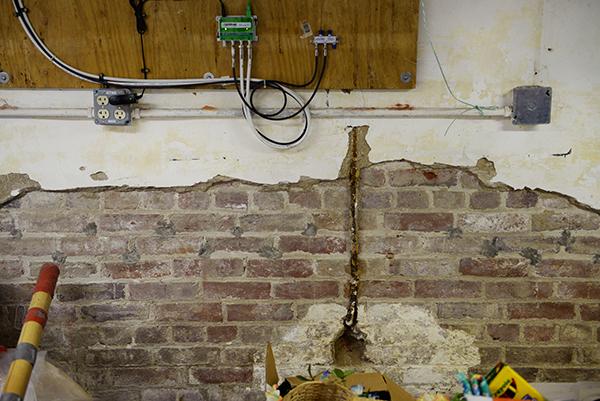Student Association President Nick Gumas is lobbying administrators to renovate the Multicultural Student Services Center building, where the ceiling is crumbling and the basement is inaccessible.
Last spring, Gumas said he learned that part of the ceiling fell on a professor’s desk while a group performed a dance recital on the floor above.
Though the professor was not injured, Gumas said the incident alerted him that the G Street building is “falling apart.” He also pointed to chipped paint, a cracked foundation and a basement closed off to students because of unsafe conditions.
“It’s over 100 years old. It hasn’t been touched in decades, and the University’s response has been patchwork,” Gumas said.
The University has recently given the center cosmetic upgrades, including replacing old televisions and couches. The MSSC’s director, Michael Tapscott, declined to provide details about when the townhouse was built or last renovated.
“The townhouse is safe and its day-to-day operations and use remains unchanged,” Tapscott said in an email. He declined to sit for an interview.
Gumas said spotty upgrades have, from students’ perspectives, made it livable. Most students who frequent the house note there are comfortable, cozy areas to meet with friends.
Still, Gumas said the space is insufficient for those who use the space. He said the community of students there, including members of the Black Student Union, LGBT Resource Center and Asian Student Alliance, often think of the center as their primary tie to GW.
“After a certain point, you get into the mindset of, ‘It is what it is, and we’ll have to make the most of it,'” Gumas said. “For me, that’s not something I feel is the message we should be sending to any student, but in particular students of special populations that are already associated with a whole host of challenges.”
Executive Vice President Avra Bossov added that GW had offered space to the MSSC on the fifth floor of the Marvin Center when it added Colonial Crossroads in 2012, but the organization turned down the chance to move. The multicultural student groups preferred the atmosphere of the townhouse, Bossov and Gumas said.
Black Student Union President Kheri Freeman said her organization uses the townhouse constantly. While students who spend time in the building haven’t been part of renovation talks so far, Freeman said most groups know to avoid the basement.
Several students described the building as home-like, where people hold weekly meetings, study or drop in to say hello to friends sitting in the “living room.”
“You kinda just pop in and know someone will be there,” Freeman said.







